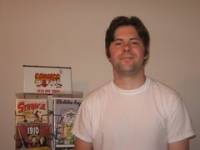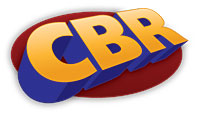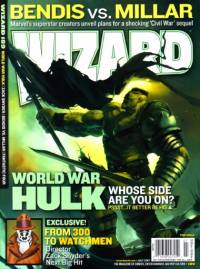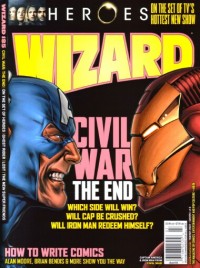
December 28, 2010
 CR Holiday Interview #8—Kiel Phegley
CR Holiday Interview #8—Kiel Phegley

 Kiel Phegley
Kiel Phegley is one of a tiny handful of people whose primary job is writing news related to the making of comics, which he does for the dominant North American comic book industry news source of the day,
Comic Book Resources. It's not a gig I can fathom. My two forays as a newshound whose nose was aimed, in part, at the crotches of the North American comic book industry, came in what are now completely different and far-removed eras. In my first gig I was required to write six or seven stories over a four- to five-week period; in the second I was encouraged although not required to file a story one or twice a week. Phegley seems to post articles all the freakin' time, and from the outside looking in seems to spend a significant majority of his work week playing catch on publishing news stories with heavy-hitters on their home turf -- an easy gig to criticize, a nearly impossible gig to maintain with aplomb. I'd say Phegley makes it look easy, but I'd be lying: it looks hard. It's more than worth our attention that the former
Wizard employee and current Chicago resident makes his job look achievable and honorable. I thought 2010 was a transitional, slippery year to understand in terms of comics news, and I'm happy Phegley agreed to explain some things to me. -- Tom Spurgeon
*****
TOM SPURGEON: Kiel, I'm aware of your work story to story but I'm not certain that I know exactly what it is you do on a comprehensive scale. What is your actual job title, and what does that entail in terms of how much writing you'd doing and what kind of writing you're doing? What's your comics-related workday like?
 KIEL PHEGLEY:
KIEL PHEGLEY: My title is CBR News Editor, which I'm not sure is a new job, though site owner/executive producer
Jonah Weiland is fond of blowing smoke up my ass by telling people I'm "
CBR's first true News Editor" whatever that means. Basically, I'm the lead writer for the News section of the site, which encompasses a lot of what you see on the front page, and I help to coordinate our News staff for product, arts and event coverage. I spend most of my days e-mailing the other staffers (too many excellent talents to name without forgetting someone and feeling awful about it) to make sure we're hitting the major releases with interviews and new stories, and when things like conventions or Hollywood events come up, I'm helping Jonah divide the labor amongst whoever we have on hand and chasing embargoed stories.
As for my own writing, I try to turn around at least one meaty feature with comics talent each and every day, though sometimes I'm off that pace. In between conducting and transcribing interviews, I'm responsible for writing the copy that goes along with any breaking news we feel is relevant to our audience. For example, is
Mark Millar declaring that he's purchased Australia to turn it into his own media empire/
Hit Girl-themed amusement park? I'll write that up. Has Marvel just announced that
Alan Thicke has been cast as
Dr. Strange? I'll write that up. Did some asshole just stab a kid in the eye at San Diego? I'll... etc., etc., etc.
I should also note that while people who follow the journalism side of the comics equation may be passingly familiar with my name or Jonah's name, the real unsung hero of
CBR is Senior Editor
Stephen Gerding who deals with most of the design and posting of stories on the site. Damn near every feature, preview, video, review and miscellaneous piece of text that makes its way to the front page goes through Stephen's hands at some point, and overall, I think his job is much more stressful and vital than mine, so it's a shame that his name only gets published to the site like three times a year.
SPURGEON: A couple of quick follow-ups: first, where does the writing you do about comics fit into your wider career? If someone asks, is there enough comics work that this can be said to be your full-time job? If it's one job among many, how much of your time is spent writing about comics? Is there a job or a gig that if it materialized you'd do less writing about comics -- is this a gateway to something else for you?
PHEGLEY: Though I do freelance for a few assorted pop culture sites and magazines,
CBR accounts for at least 85 to 90 percent of my income. So when I meet people at the dentist's office or wherever and they ask what I do, I say "Comic Book Journalist" and let them try and figure out what it means. Usually, they just want to know what I
really make my money from because they don't believe anyone would pay to advertise on a site about comic books. However, I should probably note that I'm in the very fortunate position to call this a full-time gig. I know that the majority of people who work jobs like mine work day jobs and do the journalism gig "for the love." I'm one of the lucky ones.
In honesty, journalism only accounts for maybe 30 to 35 hours of work on an average, non-convention week, so I have some leeway to work on other projects. I was just recently accepted into
Hamline University's M.F.A. program in Writing for Children and Young Adults in St. Paul (I start my first residency in January) so I think that qualifies as something that I view as eventually taking me away from what I'm doing now. I actually have a degree in English with a focus on prose fiction and never worked for so much as a high school newspaper before starting the comics journo gig. Still, the M.F.A. is a distance-learning program where I'll still be working from home, and time-wise it looks like this just means I'll be doing a lot more fiction writing during nights and weekends rather than doing less
CBR work. I'm really happy with my job now and figure I'll stay in it for a few years yet, and I doubt I'll ever leave comics behind entirely.
SPURGEON: I probably should have asked this right off the bat, but how did you score your current gig? I think of you as someone who was around before that, but I can't for the life of me remember where that is or what caused you to move from that position to this one? I'm thinking your relationship to comics has been a lifetime, but you've actually worked in comics most of your adult life, haven't you? What is something that you might use in this current job that you learned or developed in an older one?
PHEGLEY: I worked at
Wizard Magazine for a few years before this. It's funny. There are
far more former
Wizard guys kicking around the industry in jobs from journalism to editorial to marketing to creative than most people would ever suspect, and I've taken to joking that being at
Wizard comes in three phases. First, there's the phase where you meet someone at the bar, and they say, "Oh hey... don't you work for
Wizard?" Next, you bump into someone and they ask, "Didn't you used to work at
Wizard?" Finally, people respond to the news by going, "
You used to work at
WIZARD?!?!" I'm not quite sure I've hit phase three yet.

The
CBR gig came almost immediately on the heels of that job. I was let go from
Wizard for... I'm not sure I've ever been able to divine all the specific reasons as very little were given to me at the time, but driving home that day, I called some of my contacts at publishers to let them know the news. By the time I'd gone from my office to my apartment, someone had informed Jonah what happened, and he'd already sent me a
Facebook message offering work. I started as a
CBR freelancer a few weeks later -- my first gig being live coverage of Wizard's Philly convention -- and after a little over a year freelancing took the News Editor gig.
Before that incredibly long-winded series of events, I was an editorial intern at
DC Comics back in college, and I couldn't talk about my work in the industry without mentioning that I pretty much owe my entire career to the insanely rad
Ivan Cohen at DC who picked my paltry resume out of a stack of blind submissions and gave me the gig sight unseen (Ivan's since gone on to work for DC's Hollywood wing, recently getting a producing credit on
that 75th Anniversary DVD Ryan Reynolds narrated). So yes, aside from some scattered teaching work, I've pretty much been in comics career-wise since I got out of college.
Overall, I think what I being most from my past work into
CBR is a preference for magazine-style writing in general over the day-to-day news stuff, but I'm not sure how much anyone who reads the site will see that. I'm constantly looking for ways to plan out our coverage in a way where we're not just scrambling to get the news out but are bringing a bit more thought and time to feature writing. In some ways, we've been successful with more "column-style" interview series attached to specific publishing lines and with the news burden being shared on some fronts by our excellent
Robot 6 and
Spinoff Online blogs. Still, my broader goal on
CBR for 2011 is to build a space in the staff's scheduling where people can make time for longer, more in-depth writing on what interests them about the medium and the business.
SPURGEON: You mentioned that you were part of the slow, grinding, terrible crash to earth that was Wizard Entertainment's downsizing a few years back. I find it kind of remarkable given what must have been a distressing time that you immediately reached out to comics folks and found purchase rather than fleeing comics with all deliberate speed. Do you have lingering memories how things were at the end for so many of you at Wizard? Also, I find it interesting that so many of you are still working in different areas of comics, it was kind of like there was a Wizard diaspora -- is there a fraternity of ex-Wizard people of which you're a part?
PHEGLEY: It's strange to look back at that.
Wizard was in many ways a great place to work because creatively, editorial was filled with a lot of people who were very passionate and dedicated to making comics (or toys or anime or what have you) really fun and engaging for a general audience and for the hardcores. But there was also a real divide at that company between the folks making the editorial content of the magazines and the people in charge of things like conventions or the online store that
Gareb Shamus' brother ran, who were all placed on a separate floor at Wizard's offices. Not to say the people who worked "upstairs" at the company were necessarily bad people or anything, but there was a definite disconnect for a lot of us between what they did and what we did. I hardly ever spoke to anyone upstairs outside of chit chat at the bar at cons, and even people in editorial who had to interact with them in the general course of business seemed to get handed weird requests and edicts from on high.

When the layoffs started rolling through, I think what sticks most with me was a kind of total uncertainty about what was going on with the company in general. For example, I remember after Editor-in-Chief
Pat McCallum was fired they held a meeting for us where we were told that overall, we were doing a great job. Despite a lax market for print magazines in general and a migration of a lot of comics news to the internet, we'd apparently done a fine job of making
Wizard a magazine that did well in bookstores. Covering Hollywood superhero movies had kept circulation up. Pat's firing should not be taken as a sign that things would turn bad financially for the company. And on and on. Within a year, the staff had gone from around 17 or 18 people to less than a dozen, and by now I think there are three editorial and one researcher putting
Wizard out monthly (guys who, I should add, are a talented, smart bunch whom I wish the best for). How could we have done such a fine job and also have gotten laid off in such big numbers? Who the fuck knows, man. I doubt anybody really has a clear picture of that company's finances and choices outside of Gareb, and it certainly was tough to work there never knowing when the other shoe would drop. Although, in retrospect I'm not sure that's much different than any company entering a tailspin.
As for a fraternity of ex-
Wizard people, I'm not sure there's anything as organized as that. I certainly talk to a lot of folks from that place -- maybe as many as 20 or 25 -- but I don't think our connection is built on anyone trying to keep industry contacts going or doing networking. Like I said, the editorial staff at
Wizard was full of some of the smartest, funniest, most comics-loving people you can imagine, and the people I still talk to I consider my close friends rather than my former co-workers.
SPURGEON: I think it's fair to say -- let me know if if you disagree! -- that a lot of CBR
's news is tied into promotion cycles. You get the access you get in part because somebody has a specific agenda in terms of getting a product or an idea over with your audience. I know you've probably heard the accusations that come with a job like yours. How do you keep your journalistic skepticism alive when dealing with what are sometimes charismatic, convincing people that want to get you on their side? Have you ever done a piece where you think that maybe the subject thought you were coming on a bit too strong?
PHEGLEY: No, it's fair to say that a lot of our coverage is driven by product being released, and a lot of the product covered has its basic information dolled out in bits and bobs by publishers trying to maximize their PR potential. At the same time, I'm not sure that's very different from any entertainment field from movies to books to theater or what have you. And yes, I've heard plenty of accusations or criticisms of what we do ranging from the simple, "Your line of questioning is uninteresting to me" through to the wildly mean-spirited, "Fuck you, you obviously-paid shill for
Marvel and DC... you're nothing but a Goddamned liar!" And honestly, I think those kinds of responses from my readership (well, the reasoned ones) affect how I approach my job far more than the charms of publicists and publishing executives do.
To a large extent, I feel that way because Jonah is fiercely independent with how he runs
CBR and how we generate our content. Surely, there are times when publishers release promotional items -- teasers or limited product information or solicitation copy -- where we feel the information is still newsworthy and of interest to our audience. But at the same time, there are plenty of things we turn down or opt not to cover as much if we don't feel it has an impact on the readers and the business. And if ever a publisher tries to tell us that there are questions we have that we "can't ask" or a story they want us to kill otherwise we won't be granted access to things like previews or even interviews with company representative -- in other words, if they ever try to strong arm us into playing news to their advantage -- I have 100 percent faith that Jonah will tell them to take a walk. He's done so before with companies large and small, and working in an environment where you know that telling a story in an honest way is valued over weird backdoor business deals is a great relief.
But that doesn't really answer the question, does it? I'm not sure I can recall a time where I upset an interview subject, though there are a few occasions where people would have preferred I switched to a different line of questioning -- a run of "
Cup O' Joe" columns where we continued to come back to the $3.99 price point comes to mind. Generally, I think people find me kind of non-threatening -- mostly because I sound like the world's wimpiest 12-year-old on the phone. There are times I wish for myself that I would've pushed harder on a question or two, but usually I find that getting better information from people comes from having more specific questions on hand that don't allow for PR hand-waving responses. Still, some people are going to give you the answer they've decided on no matter how you phrase the question, which you learn to deal with.
 SPURGEON: Before I start asking you about specific 2010 news stories, I wonder if you would step back and tell me, as honestly as you can, what kind of year you thought it was for comics. Good? Bad? Indifferent? Trouble on the horizon? A transitional year? If you had to sum the year for your industry for an interested person at a cocktail party, what would you tell them?
SPURGEON: Before I start asking you about specific 2010 news stories, I wonder if you would step back and tell me, as honestly as you can, what kind of year you thought it was for comics. Good? Bad? Indifferent? Trouble on the horizon? A transitional year? If you had to sum the year for your industry for an interested person at a cocktail party, what would you tell them?
PHEGLEY: I don't think 2010 was so hot for comics, but it wasn't the kind of major downturn a lot of people have been fearing for a while. It's hard to take the shape of the business side of comics as so much of the hard information is locked down like state's secrets by the publishers, but my best guess would be that people sold less comics than in 2009, even when you factor in the abstract idea of digital sales. The direct market certainly seemed to wither ever so slightly while manga continued to spiral through its first "post-craze" crash. Although I think the former may be more an effect of the long tail of the recession while the latter is more of a cultural shift. At the same time, I don't think there were any massive hits for comics in 2010 -- no new series or ideas that took off in a way that screamed "this is the thing" either on the superhero mainstream side of things or in the broader graphic novel category. My best guess would be that the last major hits on either end of what I'm thinking would still be
Blackest Night or
Crumb's Genesis, which both really belong to 2009.
In cocktail party terms, I'd say that print comics respectably limped their way through what's been a much tougher period for other retail segments (most notably general book stores) while digital comics grew quite a bit in a lot of ways that I'm not sure people have a real grasp on or that will even remain this way by the end of 2011.
 SPURGEON: I'm sort of generally confused by DC Comics, and as someone who has both written and editorialized on the company's recent spate of moves, I wondered if for following them more closely you have any insights on some of the things that confuse me. For instance, what does Diane Nelson do? I don't mean that in a confrontational sense, I'm just slightly baffled as to her unique contribution. What DC thing have we seen that feels to you like it has Nelson's fingerprints on it, even if only something that is different than could have happened three years ago? I mean, for example, I could have sworn when she was hired that someone with her famous people skills would have meant DC would reach a better place with Alan Moore, and the opposite has happened.
SPURGEON: I'm sort of generally confused by DC Comics, and as someone who has both written and editorialized on the company's recent spate of moves, I wondered if for following them more closely you have any insights on some of the things that confuse me. For instance, what does Diane Nelson do? I don't mean that in a confrontational sense, I'm just slightly baffled as to her unique contribution. What DC thing have we seen that feels to you like it has Nelson's fingerprints on it, even if only something that is different than could have happened three years ago? I mean, for example, I could have sworn when she was hired that someone with her famous people skills would have meant DC would reach a better place with Alan Moore, and the opposite has happened.
PHEGLEY: Search me, Tom. Actually, that may be a bit too dumb of an answer to give. I'll say this: I find myself generally perplexed by what executives at big media companies do period aside from oversee massive budgets and look for weird opportunities to exploit tax breaks in Australia or whatever. I know that in the past decade or so we've seen a rise in so-called "Creative Executives" who are supposedly better at coming up with story ideas on the company end, but in practice just seem to end up pissing off talent. Diane Nelson doesn't strike me as doing either of these things.

Permalink
Daily Blog Archives
November 2019
October 2019
September 2019
August 2019
July 2019
Full Archives


